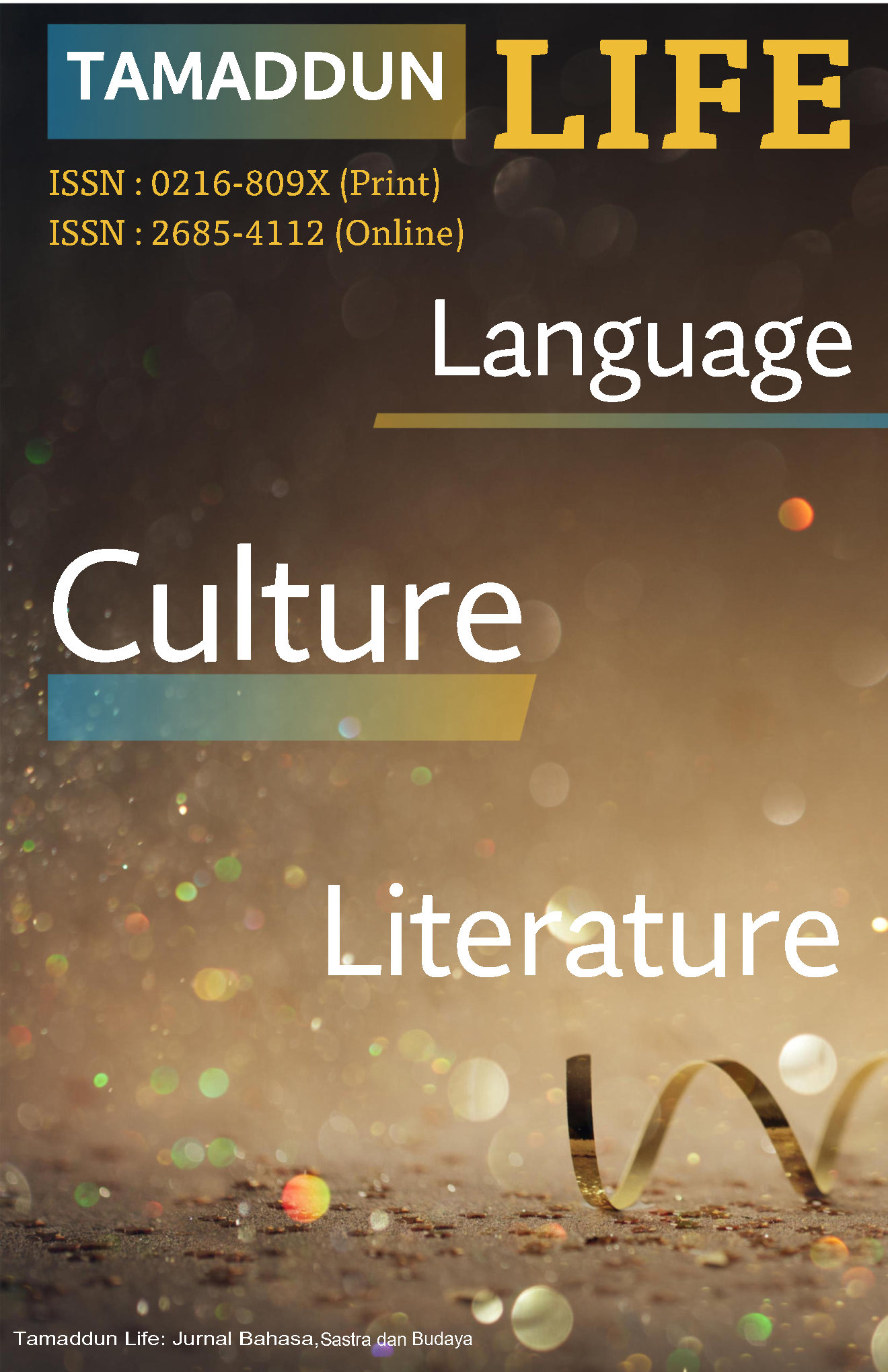Better to Die Young": A Hermeneutic Analysis of Protest and Moral Critique in Remy Sylado’s Mbeling Poetry
DOI:
https://doi.org/10.33096/tamaddun.v24i1.943Kata Kunci:
Hermeneutics, Mbeling poetry, Schleiermacher, Indonesian literatureAbstrak
This study analyzes the socio-political critique embedded in Remy Sylado’s poem Lebih Baik Mati Muda through Friedrich Schleiermacher’s hermeneutic framework, specifically integrating grammatical and psychological interpretations. As a pioneering figure in the Indonesian Mbeling poetry movement, Sylado strategically employed colloquial language, provocative diction, and emotionally charged imagery to confront systemic corruption, authoritarianism, and moral decay during Indonesia’s New Order regime. Using qualitative descriptive methodology, the analysis first examines the poem’s grammatical elements such as diction, rhetorical structures, and repetition to reveal how linguistic deviation amplifies the poet's socio-political critique. Subsequently, psychological interpretation uncovers deeper emotional dimensions, highlighting how the narrative voice conveys generational despair and moral urgency. Findings indicate that Sylado’s recurrent phrase Lebih baik aku mati muda ("Better that I die young") symbolizes an existential and ethical ultimatum, articulating a powerful stance against oppressive societal conditions. The study contributes methodologically by applying Schleiermacher’s dual hermeneutic approach to Indonesian protest poetry, theoretically by deepening scholarly understanding of poetry's role in social resistance, and practically by underscoring poetry’s educational potential in fostering critical literacy and civic engagement. Future research is recommended to expand comparative and multimodal analyses of protest poetry, enhancing understanding of its cognitive and emotional effects across different contexts.
Referensi
Aisyah, S. (2024). Breaking conventions: A study of linguistic deviation in Indonesian Mbeling poetry. Indonesia University Press.
Buchanan Palmer, J. (2025). Poetry as protest in the digital age: Linguistic empathy and social movements. Journal of Literary Cognition, 17(1), 45–62. https://doi.org/10.1080/19412321.2024.1923456
Fathurohman, I., Wiranata, A., & Hidayatullah, A. (2018). Counter-hegemonic narratives in Indonesian literature under the New Order. Indonesian Journal of Literary Studies, 6(2), 145–162.
Foulcher, K. (2021). Indonesia's literary history: Resistance and memory from Sukarno to Reformasi. Brill.
Herianah, R., Satriawan, H., & Rahmawati, I. (2024). Sonic indictment: Sound symbolism and protest in Indonesian Mbeling poetry. Southeast Asian Literary Review, 9(2), 88–105. https://doi.org/10.4567/sealr.v9i2.6789
Kim, H., Sefcik, J. S., & Bradway, C. (2022). Characteristics of qualitative descriptive studies: A systematic review. Research in Nursing & Health, 45(1), 54–68. https://doi.org/10.1002/nur.22121
Lane, M. (2023). Memories of dissent: Literary responses to authoritarianism in Indonesia. Cornell University Press.
Mansur, T. (2023). Poetry, empathy, and the brain: Cognitive-affective processing of metaphorical language. Neuroscience and Literature, 3(1), 25–39.
Miller, D., & Sibarani, R. (2024). Re-imagining Wiji Thukul: Personal trauma and collective resistance in Indonesian protest poetry. Journal of Southeast Asian Politics, 15(2), 112–128. https://doi.org/10.1177/1235678923114567
Ministry of Education, Culture, Research, and Technology. (2023). Guidelines for ethical conduct of humanities research in Indonesia. Indonesian Government Press.
Nabilah, F., & Lestari, D. (2023). Exploring humor and critique in Remy Sylado’s Mbeling poetry. Journal of Indonesian Literature, 11(1), 12–28. https://doi.org/10.2123/jil.v11i1.7890
O’Keeffe, P. (2022). Schleiermacher’s hermeneutics: Revisiting grammatical and psychological interpretation. Journal of Hermeneutic Studies, 16(3), 221–237. https://doi.org/10.1080/17557340.2022.1945678
Palmer, R. E. (1969). Hermeneutics: Interpretation theory in Schleiermacher, Dilthey, Heidegger, and Gadamer. Northwestern University Press.
Palmer, S. (2025). Empathic uptake in protest poetry: How linguistic form enhances emotional engagement. Poetics Today, 46(2), 95–115. https://doi.org/10.1215/03335372-1028456
Perryman, E. (2023). Ethical considerations in archival literary research. Literary Ethics Journal, 8(2), 54–69.
Poetry & Brain Consortium. (2025). Poetic form and cognitive-emotional resonance: An interdisciplinary report. Harvard University Press.
Robinson, D. (2022). Schleiermacher’s hermeneutic spiral: Between text and context. Hermeneutics Journal, 15(4), 345–362. https://doi.org/10.1080/17557340.2022.1936743
Setiawan, B. (2023). Literary dissent in Indonesia post-Reformasi: Resistance through affective solidarity. Journal of Southeast Asian Studies, 54(3), 345–363. https://doi.org/10.1017/S0022463423000345
Silalahi, D. M., Simbolon, H., & Simbolon, P. (2022). Rebellious rhyme: Socio-political resistance in Indonesian Mbeling poetry. Southeast Asian Literary Review, 7(1), 23–40. https://doi.org/10.4567/sealr.v7i1.3452
Stanford Encyclopedia of Philosophy. (2022). Friedrich Schleiermacher’s hermeneutics. Retrieved from https://plato.stanford.edu/entries/schleiermacher-hermeneutics/
Taum, Y. Y. (1997). Indonesian literature and the politics of identity: From colonialism to Reformasi. Kanisius Press.
Widyaningrum, L., & Hartani, T. (2023). Literature and its definitional challenges in contemporary scholarship. Journal of Indonesian Literature, 11(2), 100–114. https://doi.org/10.2123/jil.v11i2.8123
Unduhan
Diterbitkan
Terbitan
Bagian
Lisensi
Hak Cipta (c) 2025 Muhammad Rapi, Ridwan Ridwan, Vionanda Toding Bunga

Artikel ini berlisensi Creative Commons Attribution 4.0 International License.
Authors who publish with Tamaddun journal agree to the following terms:
1. Authors retain the copyright and grant Tamaddun the right of first publication. The work will be licensed under a Creative Commons Attribution License (CC BY 4.0), which permits others to share the work with proper acknowledgment of the authorship and initial publication in this journal.
2. Authors may enter into additional non-exclusive agreements for the distribution of the published version of their work (e.g., posting it to an institutional repository or including it in a book), provided that the initial publication in this journal is acknowledged.
3. Authors are encouraged to post their work online (e.g., in institutional repositories or on their personal websites) before and during the submission process. This can lead to productive exchanges and increase the visibility and citation of the published work.






